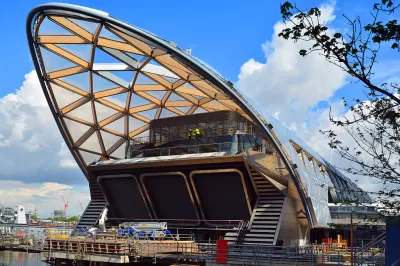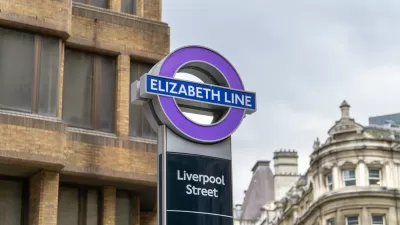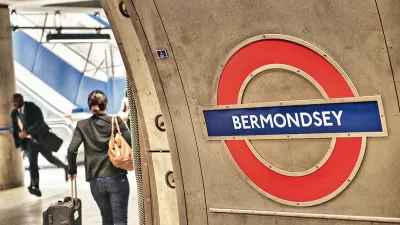London's Crossrail promises faster commutes and neighborhood revitalization in a global economic hub. But what if Brexit puts a damper on that future?

For the New York Times, Michael Kimmelman writes, "Crossrail is not your average subway. London's $20 billion high-capacity, high-frequency train line, which plans to start taking passengers late next year, is billed as Europe’s biggest infrastructure project. It will be so fast that crucial travel times across the city should be cut by more than half."
But the U.K.'s decision to leave the European Union has sown doubts. "Now, with Brexit, the nightmare scenario is that this massive project, to provide more trains moving more people more quickly through a growing city, ends up moving fewer people more quickly through a shrinking city."
In addition to providing for London's elites, Crossrail was conceived with some social good in mind. "While it will whisk bankers at new speeds from their office towers and multimillion-dollar aeries to Heathrow, it will also help millions of now-marginalized, lower-income workers, unable to afford runaway home prices in and around the center of the city, to live in cheaper neighborhoods often far from their jobs."
After Theresa May's campaign threatened to defund a extension to the line, since then "the government's transport secretary has endorsed the project — provided that the city pay half the whopping cost, upfront. The semi-reversal suggested a grudging acknowledgment that, whatever the political fallout or economic prospects, Britain ultimately needs a thriving London all the more after Brexit."
FULL STORY: London’s New Subway Symbolized the Future. Then Came Brexit.

Alabama: Trump Terminates Settlements for Black Communities Harmed By Raw Sewage
Trump deemed the landmark civil rights agreement “illegal DEI and environmental justice policy.”

Study: Maui’s Plan to Convert Vacation Rentals to Long-Term Housing Could Cause Nearly $1 Billion Economic Loss
The plan would reduce visitor accommodation by 25% resulting in 1,900 jobs lost.

Planetizen Federal Action Tracker
A weekly monitor of how Trump’s orders and actions are impacting planners and planning in America.

Waymo Gets Permission to Map SF’s Market Street
If allowed to operate on the traffic-restricted street, Waymo’s autonomous taxis would have a leg up over ride-hailing competitors — and counter the city’s efforts to grow bike and pedestrian on the thoroughfare.

Parklet Symposium Highlights the Success of Shared Spaces
Parklets got a boost during the Covid-19 pandemic, when the concept was translated to outdoor dining programs that offered restaurants a lifeline during the shutdown.

Federal Homelessness Agency Places Entire Staff on Leave
The U.S. Interagency Council on Homelessness is the only federal agency dedicated to preventing and ending homelessness.
Urban Design for Planners 1: Software Tools
This six-course series explores essential urban design concepts using open source software and equips planners with the tools they need to participate fully in the urban design process.
Planning for Universal Design
Learn the tools for implementing Universal Design in planning regulations.
Caltrans
Smith Gee Studio
Institute for Housing and Urban Development Studies (IHS)
City of Grandview
Harvard GSD Executive Education
Toledo-Lucas County Plan Commissions
Salt Lake City
NYU Wagner Graduate School of Public Service





























